
Joule
Scope & Guideline
Igniting Innovation in Energy Research
Introduction
Aims and Scopes
- Renewable Energy Technologies:
Joule publishes research on various renewable energy sources, including solar, wind, and bioenergy, exploring innovative materials and systems that enhance energy conversion and storage efficiency. - Energy Storage Systems:
The journal emphasizes advancements in energy storage technologies, particularly batteries and supercapacitors, focusing on novel materials and configurations that improve energy density, longevity, and cost-effectiveness. - Electrocatalysis and Chemical Conversion:
Research on electrocatalytic processes for energy conversion, including CO2 reduction and hydrogen production, is a significant focus, addressing methods to enhance efficiency and selectivity in chemical reactions. - Thermoelectric Materials and Devices:
Joule highlights the development of thermoelectric materials that convert temperature differences into electrical energy, emphasizing the design and optimization of materials for enhanced performance. - Sustainable Energy Solutions:
The journal promotes research on sustainable practices and technologies, including carbon capture, energy efficiency improvements, and innovative approaches to reducing the environmental impact of energy systems.
Trending and Emerging
- Perovskite Solar Cells and Tandem Technologies:
Research on perovskite solar cells, particularly their efficiency and stability in tandem configurations, has increased significantly, driven by the potential for high-performance solar energy conversion. - Battery Technologies and Materials:
There is a growing trend towards advanced battery technologies, focusing on novel materials that enhance energy storage capabilities, such as sodium-ion and zinc-ion batteries, reflecting the push for sustainable energy storage solutions. - Machine Learning and Data-Driven Approaches:
The integration of machine learning and data analytics in energy research is on the rise, facilitating improved predictions, optimizations, and insights into energy systems and materials. - Electrochemical CO2 Reduction:
The focus on electrochemical methods for CO2 reduction and conversion into valuable chemicals is gaining momentum, emphasizing the need for innovative solutions to mitigate climate change. - Sustainable Hydrogen Production:
Emerging research on sustainable hydrogen production methods, including electrolysis and photoelectrochemical processes, reflects a significant trend toward clean energy carriers.
Declining or Waning
- Traditional Fossil Fuel Technologies:
Research centered on conventional fossil fuel technologies has decreased, as the global focus shifts towards renewable energy solutions and sustainable practices. - Basic Research in Energy Conversion without Application Focus:
There is a noticeable decline in publications that focus solely on fundamental energy conversion processes without a clear application or relevance to current energy challenges. - Low-Impact Energy Sources:
Studies related to low-impact energy sources that lack scalability or significant impact on energy systems are becoming less prominent, as researchers prioritize high-impact innovations.
Similar Journals
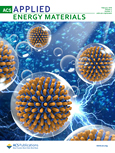
ACS Applied Energy Materials
Pioneering Research for a Sustainable Energy TomorrowACS Applied Energy Materials, published by the American Chemical Society, is a premier journal dedicated to the cutting-edge fields of energy materials, chemical engineering, and electrochemistry. With an impressive impact factor and consistently ranked in the Q1 category across multiple disciplines—including Chemical Engineering, Electrical and Electronic Engineering, and Materials Chemistry—this journal serves as a pivotal platform for researchers and professionals focused on innovative solutions for energy systems and materials science. Since its inception in 2018, ACS Applied Energy Materials has been committed to disseminating high-quality research that addresses pressing energy challenges, promoting sustainability and efficiency in various applications. Its competitive Scopus rankings reflect the journal's influence and relevance within the academic community, making it an essential resource for anyone looking to stay at the forefront of energy materials research.
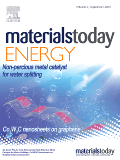
Materials Today Energy
Empowering Research for a Greener Energy FutureMaterials Today Energy is a premier journal published by Elsevier, focusing on the interdisciplinary field of energy materials. With an ISSN of 2468-6069, the journal is renowned for its impactful research as evidenced by its impressive Q1 quartile rankings in multiple categories including Energy Engineering and Power Technology, Fuel Technology, and Renewable Energy. It stands out with strong Scopus rankings, highlighting its significance in the respective research communities, such as being ranked 3rd in Nuclear Energy and Engineering. Established from 2016 to 2024, the journal aims to provide a platform for innovative research that addresses the global demands for sustainable energy solutions. Although it is not open access, Materials Today Energy is accessible to a broad audience, encouraging collaborations among researchers, professionals, and students in the pursuit of advancing materials science and energy technologies. This makes it an essential resource for those looking to remain at the forefront of discoveries that shape the future of energy.
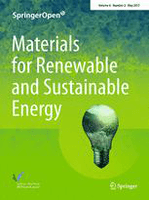
Materials for Renewable and Sustainable Energy
Empowering sustainable energy through cutting-edge materials research.Materials for Renewable and Sustainable Energy, published by SPRINGER HEIDELBERG, stands at the forefront of research dedicated to advancing the fields of materials science and sustainable energy solutions. With an ISSN of 2194-1459 and an E-ISSN of 2194-1467, this prestigious journal has gained recognition as an Open Access platform since 2012, allowing broader access to innovative research. Situated in Switzerland, it boasts a distinguished reputation, reflected in its impressive H-index and classification within the Q1 and Q2 categories across multiple relevant fields, including Electronic, Optical and Magnetic Materials, Fuel Technology, Materials Chemistry, and Renewable Energy. Its Scopus rankings affirm its significance, particularly notable with a 29th place in Fuel Technology, placing it in the 77th percentile among peers. Covering a comprehensive array of topics from sustainable materials to cutting-edge energy technologies, Materials for Renewable and Sustainable Energy aims to disseminate pivotal knowledge that addresses the global challenges of sustainability and environmental preservation, making it an invaluable resource for researchers, professionals, and students alike.
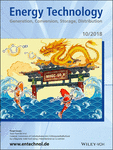
Energy Technology
Shaping Tomorrow's Energy Landscape TodayEnergy Technology, published by Wiley-VCH Verlag GmbH, is a prominent peer-reviewed journal dedicated to advancing the field of energy research and technology. With an ISSN of 2194-4288 and an E-ISSN of 2194-4296, this journal has made a significant impact in the energy sector, holding a Q2 category ranking in the Energy (miscellaneous) category for 2023, and proudly positioned in the 77th percentile within the Scopus ranking for General Energy. Since its inception in 2013, Energy Technology has consistently published cutting-edge research, innovations, and reviews that cater to a wide array of topics including renewable energy, sustainable technologies, and energy efficiency. The journal does not offer open access, yet it remains a key resource for researchers, professionals, and students who are committed to exploring the dynamic field of energy. The journal's efforts to disseminate rigorous scholarship make it an invaluable asset for anyone looking to contribute to or understand the future of energy-related technologies until 2024.

EnergyChem
Empowering Researchers to Shape the Future of Energy.EnergyChem is a premier academic journal published by ELSEVIER, dedicated to advancing the field of energy chemistry and its applications in sustainable technologies. With a strong focus on biomaterials and innovative chemistry solutions, the journal has established itself as a leading platform within the research community, boasting remarkable rankings such as Q1 in Biomaterials, Chemistry (miscellaneous), and Energy (miscellaneous) for 2023. Notably, it ranks 2nd in both Materials Science and Energy categories, reflecting the high caliber of research it publishes, which is crucial for tackling pressing global energy challenges. Since its inception in 2019, EnergyChem has been committed to open and accessible research, making it an invaluable resource for researchers, professionals, and students striving for cutting-edge insights in energy conversion and storage. With its target audience in mind, the journal encourages submissions that explore innovative materials, processes, and applications that will contribute to a sustainable energy future.

Energy Storage
Empowering Innovations in Energy StorageEnergy Storage, published by WILEY, is a pivotal journal dedicated to the rapidly evolving field of energy storage technologies. Since its inception in 2019, the journal has established a significant platform for researchers and professionals by providing insightful articles that explore innovations and advancements in energy engineering and renewable energy systems. With an Impact Factor positioning it in the Q3 category for both Energy Engineering and Power Technology and Renewable Energy, Sustainability, and the Environment, Energy Storage plays a crucial role in disseminating knowledge that addresses global energy challenges. The journal is indexed in Scopus, showcasing its commitment to high-quality research, providing valuable contributions to the community including engaging studies and practical applications aimed at sustainable energy solutions. For those passionate about the future of energy, Energy Storage represents an essential resource for staying informed and connected within this dynamic and interdisciplinary field.
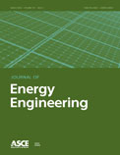
JOURNAL OF ENERGY ENGINEERING
Championing Integrity in Energy ResearchJOURNAL OF ENERGY ENGINEERING, published by the ASCE-Amer Soc Civil Engineers, serves as a pivotal resource in the fields of civil and structural engineering, energy engineering, and nuclear energy research. With an ISSN of 0733-9402 and an E-ISSN of 1943-7897, this esteemed journal demonstrates a consistent commitment to advancing knowledge in energy systems, sustainability, and waste management. Ranking within the second quartile in several categories—including Civil and Structural Engineering and Energy Engineering and Power Technology—this journal maintains a strong reputation, underscored by its Scopus rankings that place it in the top tiers of its discipline. Accessible from 1982 through 2024, the journal provides researchers and professionals meaningful insights through rigorously peer-reviewed articles, critical reviews, and case studies that address contemporary challenges in energy utilization and infrastructure development. Without open access options, it ensures the integrity and credibility of published work, showcasing influential research that contributes to sustainable solutions in energy and environmental frameworks. Researchers, professionals, and students alike will find the JOURNAL OF ENERGY ENGINEERING an indispensable platform for exploration and dissemination of innovative ideas within the realm of energy and engineering.

Electrochemical Energy Reviews
Pioneering Insights in Energy Engineering and Material ScienceElectrochemical Energy Reviews, published by SpringerNature, serves as an essential platform for the dissemination of cutting-edge research in the fields of electrochemistry, material science, and energy engineering. With an impressive impact factor and ranked in the Q1 category across multiple disciplines including Chemical Engineering and Energy Technology, this journal highlights its commitment to advancing knowledge and innovation within the energy sector. Operating since 2018, the journal not only provides a valuable resource for researchers and professionals but also invites contributions from students and emerging scholars interested in the pivotal role of electrochemical processes in sustainable energy solutions. Published in Germany and widely accessible to the global research community, Electrochemical Energy Reviews is an indispensable reference for those keen on exploring the future of energy technologies.

Advanced Energy and Sustainability Research
Pioneering Insights in Energy and SustainabilityAdvanced Energy and Sustainability Research is a leading open-access journal published by WILEY since 2020, dedicated to advancing knowledge and understanding in the realms of energy and sustainability. With an impressive impact factor and a commitment to high-quality, peer-reviewed research, this journal serves an international audience of researchers, professionals, and students passionate about addressing critical environmental challenges. The journal encompasses a wide array of topics within environmental science and energy fields, securing notable rankings in Scopus with top percentiles across several categories, including Ecology, Energy Engineering and Power Technology, and Waste Management. Given its open-access model, Advanced Energy and Sustainability Research facilitates the dissemination of cutting-edge research, enhancing accessibility and fostering collaboration within the scientific community. This journal not only plays a pivotal role in shaping public policy and industry practices but also aims to inspire innovative solutions for sustainable development in an increasingly complex world.

Energy & Environmental Materials
Catalyzing Change through Cutting-Edge ResearchEnergy & Environmental Materials, published by WILEY, is an esteemed academic journal dedicated to pioneering research in the multifaceted domains of energy, environmental science, and materials science. Since its inception in 2018, this journal has rapidly established itself as a leading platform, holding a prestigious Q1 ranking across multiple categories including Renewable Energy, Sustainability, and Waste Management, reflecting its significant contributions to advancing knowledge in these critical areas. With a robust Scopus ranking that positions it in the top percentile for Environmental Science and Materials Science, it caters to a diverse audience of researchers, professionals, and students seeking cutting-edge findings and practical applications in energy efficiency and sustainable materials. This open-access journal facilitates the dissemination of innovative research and aims to bridge the gap between scientific exploration and real-world solutions for a sustainable future. The editorial team encourages submissions that explore both theoretical and practical aspects, ensuring that every publication not only contributes to the academic landscape but also drives impactful change in energy and environmental practices.